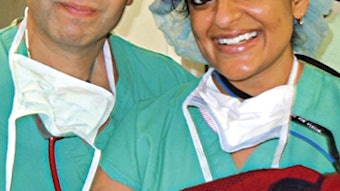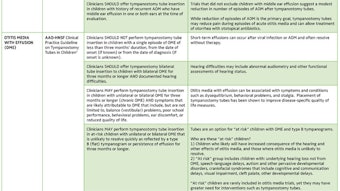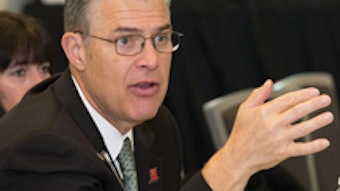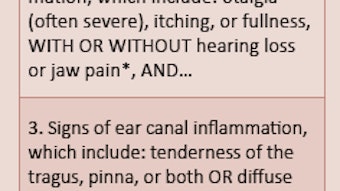Developing Leadership
David R. Nielsen, MD AAO-HNS/F EVP/CEO Early in my undergraduate education, I was fortunate enough to take a course in business law taught by a judge who had previously been my father’s law partner. His class was particularly memorable for me not only because I knew him personally, but also because I knew he actually practiced law and conducted his personal life according to the principles he taught. He was not content to just teach the law as it applied to business conduct, but taught the principles of living with integrity. He demanded of his students that each of us conduct our businesses with high standards of personal behavior. He asserted that every business man or woman should set personal standards of conduct that were so high, that when we achieved them, we had already exceeded the legal and professional standards required of us. He repeatedly taught that this was the essence of leadership, and that no matter where we worked, or what our pay grade or job title was, leadership would be required of us. Throughout my life, whether in personal business ventures, managing finances, running my own solo medical practice, being employed in a large multi-specialty internationally renowned clinic, volunteering, or serving as the CEO of the Academy and Foundation, I have found this to be true. I require of our staff here in Alexandria, VA, and Washington, DC, that everyone from the newest hire to the most tenured of the leaders in the C-suites demonstrate leadership in standards of personal behavior and professional conduct. I am grateful for the positive way in which your Academy staff model leadership skills and professional development. It is our desire, as well, to ensure that we provide every possible opportunity for our membership to advance their leadership through teaching opportunities (Annual Meeting; Education Committees; journal submissions; etc.); research, quality, and patient safety initiatives; health policy work (RUC; CPT; and appropriations, etc.) content committee work; BOG and BOD involvement; local community service; and international and humanitarian engagement. As part of our offerings for you, our colleagues and members, to advance your leadership skills and involvement we have provided opportunities to learn about and engage in the necessary policy and political processes that influence the practice of medicine. We invite you to attend our Leadership Forum from February 28-March 3. Our programming combines many leadership activities, including the Boards of Directors (BODs) meetings and Strategic Planning sessions, Executive Committees, the Science and Education Committee, the Board of Governors sessions, related advocacy components, and more. We also offer special content designed for Residents and Young Physicians. You can access more information about this on our members-only web page at http://www.entnet.org/LeadershipForum. This meeting is one of many academy benefits; that is, registration is free, but you must register to attend. Participation allows members opportunities to network and engage with peers and Academy leaders, as well as political and professional experts in other fields. The Board of Governors and advocacy sessions are open to everyone and begin on Sunday morning, March 2, and continue through midday on Monday, March 3. New for this year, selected qualifying sessions will offer CME credit. This year’s program includes sessions addressing: Practice management Clinical Practice Guidelines Advocacy sessions Health Policy Academy 101 Model Society Forum with best practices Sunshine Act: What you need to know BOG General Assembly and Candidates Forum National leaders and guest speakers, including leadership from the Centers for Medicare and Medicaid Service (CMS) ENT PAC Reception (ENT PAC Leadership Club members only) As the healthcare delivery systems evolve, it is increasingly necessary for physicians to understand more of the formal language of leadership and business models to ensure that the clinical concerns of patients and their doctors remain the primary focus and do not take a secondary role to the “business of medicine.” Our professionalism and Hippocratic Oath require us to continually put the interests of patients and their health ahead of our own financial or personal interests. Only through our leadership and modeling of this focus, and engagement in policy processes, can we ensure that business and financial fiduciaries (employers, purchasers, insurers, health plans and systems, and government) do the same.
David R. Nielsen, MD
AAO-HNS/F EVP/CEO
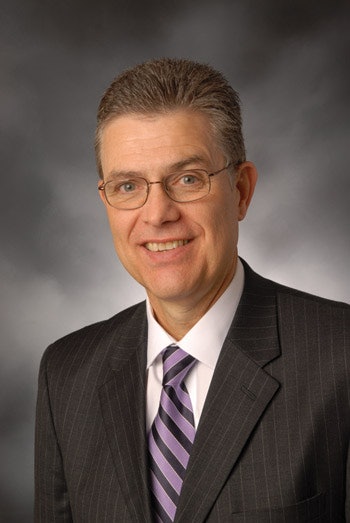 David R. Nielsen, MD AAO-HNS/F EVP/CEO
David R. Nielsen, MD AAO-HNS/F EVP/CEOEarly in my undergraduate education, I was fortunate enough to take a course in business law taught by a judge who had previously been my father’s law partner. His class was particularly memorable for me not only because I knew him personally, but also because I knew he actually practiced law and conducted his personal life according to the principles he taught. He was not content to just teach the law as it applied to business conduct, but taught the principles of living with integrity. He demanded of his students that each of us conduct our businesses with high standards of personal behavior. He asserted that every business man or woman should set personal standards of conduct that were so high, that when we achieved them, we had already exceeded the legal and professional standards required of us. He repeatedly taught that this was the essence of leadership, and that no matter where we worked, or what our pay grade or job title was, leadership would be required of us.
Throughout my life, whether in personal business ventures, managing finances, running my own solo medical practice, being employed in a large multi-specialty internationally renowned clinic, volunteering, or serving as the CEO of the Academy and Foundation, I have found this to be true. I require of our staff here in Alexandria, VA, and Washington, DC, that everyone from the newest hire to the most tenured of the leaders in the C-suites demonstrate leadership in standards of personal behavior and professional conduct. I am grateful for the positive way in which your Academy staff model leadership skills and professional development. It is our desire, as well, to ensure that we provide every possible opportunity for our membership to advance their leadership through teaching opportunities (Annual Meeting; Education Committees; journal submissions; etc.); research, quality, and patient safety initiatives; health policy work (RUC; CPT; and appropriations, etc.) content committee work; BOG and BOD involvement; local community service; and international and humanitarian engagement.
As part of our offerings for you, our colleagues and members, to advance your leadership skills and involvement we have provided opportunities to learn about and engage in the necessary policy and political processes that influence the practice of medicine. We invite you to attend our Leadership Forum from February 28-March 3. Our programming combines many leadership activities, including the Boards of Directors (BODs) meetings and Strategic Planning sessions, Executive Committees, the Science and Education Committee, the Board of Governors sessions, related advocacy components, and more. We also offer special content designed for Residents and Young Physicians. You can access more information about this on our members-only web page at http://www.entnet.org/LeadershipForum.
This meeting is one of many academy benefits; that is, registration is free, but you must register to attend. Participation allows members opportunities to network and engage with peers and Academy leaders, as well as political and professional experts in other fields. The Board of Governors and advocacy sessions are open to everyone and begin on Sunday morning, March 2, and continue through midday on Monday, March 3. New for this year, selected qualifying sessions will offer CME credit.
This year’s program includes sessions addressing:
- Practice management
- Clinical Practice Guidelines
- Advocacy sessions
- Health Policy
- Academy 101
- Model Society Forum with best practices
- Sunshine Act: What you need to know
- BOG General Assembly and Candidates Forum
- National leaders and guest speakers, including leadership from the Centers for Medicare and Medicaid Service (CMS)
- ENT PAC Reception (ENT PAC Leadership Club members only)
As the healthcare delivery systems evolve, it is increasingly necessary for physicians to understand more of the formal language of leadership and business models to ensure that the clinical concerns of patients and their doctors remain the primary focus and do not take a secondary role to the “business of medicine.” Our professionalism and Hippocratic Oath require us to continually put the interests of patients and their health ahead of our own financial or personal interests. Only through our leadership and modeling of this focus, and engagement in policy processes, can we ensure that business and financial fiduciaries (employers, purchasers, insurers, health plans and systems, and government) do the same.
